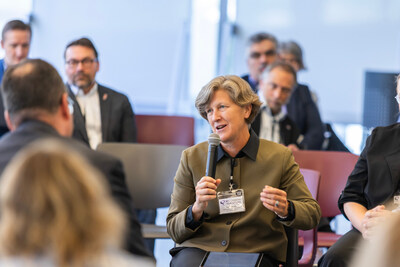National Summit sets direction for a new era of graduate education in Canada
Two days of dialogue at McMaster University signal a coordinated effort to reshape Canada's graduate education system for the future.
HAMILTON, ON, Oct. 27, 2025 /CNW/ - From October 15 to 16, over 100 research, policy, and graduate student leaders convened at McMaster University for the Big Thinking Summit: Future-ready graduate education in Canada.
Hosted by the Federation for the Humanities and Social Sciences, the Canadian Association for Graduate Studies (CAGS), and the Canadian Collaborative for Society, Innovation and Policy (CCSIP), the Summit brought together voices from across sectors to advance priorities for a National Strategy for Graduate Education that meets the realities graduate students are facing today.
Graduate education in Canada is navigating rapid and far-reaching change.
Shifting funding models, constrained budgets, and changing career pathways are reshaping graduate education, even as expectations for innovative research and societal impact continue to rise. At the same time, graduate students face mounting costs and limited job security, with growing questions about the purpose and accessibility of advanced study beyond academia.
Across two days of discussion, the Big Thinking Summit made clear that building a resilient graduate system means rethinking outdated systems, recognizing diverse perspectives, and better aligning institutions, policymakers, and funders to strengthen Canada's research and innovation capacity and sovereignty.
Canada's graduate students are already contributing to policy and innovation ecosystems. The next step is ensuring the graduate system evolves to sustain that momentum. Coordinated national action is now needed, which the Federation is poised to lead across the humanities and social sciences.
Key outcomes from the Big Thinking Summit:
"The State of Graduate Education. Perspectives on Current Disruptions" roundtable:
At the roundtable, speakers examined how graduate education systems are responding to changing student needs and technological advancements like AI, highlighting key recommendations:
- Empower graduate students to participate in institutional decision-making actively, ensuring that reforms reflect diverse experiences, including those of international students and working professionals.
- Rethink curriculum and mentorship to better prepare graduates for making an impact both inside and outside academia.
- Recognize that non-academic careers are essential to the future of graduate education, not peripheral.
"Reimagining Graduate Education: Big Ideas for a Changing World" keynote:
Keynote speakers explored how graduate education can evolve to meet the demands of a rapidly changing society, identifying areas of opportunity:
- Strengthen connections between research and the skills Canada's workforce needs.
- Embed purpose, well-being, and social responsibility into graduate training.
- Expand partnerships that support Indigenous and equity-deserving students, grounded in the principle that there can be no research excellence without equity.
"Transforming Graduate Education" roundtable:
At the roundtable, speakers explored how postsecondary institutions can develop the flexibility and leadership needed to navigate change, highlighting key priorities:
- Foster inclusive leadership and transparent governance to make institutions more agile.
- Embed equity, diversity, inclusion, and decolonization (EDID) as essential to legitimacy and excellence.
- Redefine graduate success to reflect contributions across academic, public, and private sectors.
"Building the System Canada Needs" panel:
At the panel, leaders from the research, policy, and education sectors called for coordinated national action to secure the future of Canada's graduate education system. They identified key areas for reform:
- Align institutional goals, funding, and labour priorities through a national framework.
- Modernize fellowships and grants to reflect the current realities faced by graduate students.
- Strengthen collaboration among universities, funders, and employers to create meaningful, ethical, and accessible career pathways.
Speaker quotes
Karine Morin, President and CEO, Federation for the Humanities and Social Sciences
"To ensure the vitality of graduate education, we need a shared vision and strong leadership. Progress begins with inclusion, not as an endpoint, but as the foundation. Canada must act now to ensure graduate education remains accessible and connected to the public good."
Sandra Lapointe, Director, Canadian Collaborative for Society Innovation and Policy, and The/La Collaborative
"To strengthen graduate education, Canada must move from isolated initiatives to a shared strategy. One that links knowledge creation with policy, innovation, and community needs. This is how we ensure our talent system serves both people and progress."
Fahim Quadir, President, Canadian Association for Graduate Studies; Dean of Graduate Studies, Queen's University
"The Summit invited participants to imagine the future - to think boldly about how graduate education can evolve within an ever-changing global landscape. Rather than focusing on incremental changes, it championed big ideas, bold visions, and courageous reimagining, positioning graduate education not only as a pathway to socio-economic mobility, but as a vibrant site for generating new knowledge, creativity, and leadership needed to address the world's most pressing challenges."
The outcomes from the Summit will inform a National Strategy for Graduate Education, a collaborative initiative expected in 2026. The strategy will provide evidence-based recommendations to strengthen Canada's graduate education system, ensuring it remains responsive, inclusive, and globally competitive.
The conversation continues at the Big Thinking Summit: Inflection Point, coming to Edmonton, Alberta, from June 9-11, 2026. Registration opens this winter at www.federationhss.ca/big-thinking-summit-2026.
About the Federation for the Humanities and Social Sciences
The Federation for the Humanities and Social Sciences promotes research and teaching for the advancement of an inclusive, democratic, and prosperous society. With a membership now comprising over 160 universities, colleges and scholarly associations, the Federation represents a diverse community of 91,000 researchers and graduate students across Canada. The Federation office is located on unceded territory of the Algonquin Anishinabe Nation. www.federationhss.ca.
SOURCE Federation for the Humanities and Social Sciences



